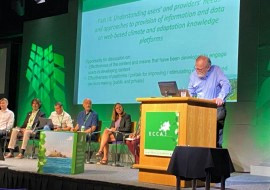With the increase of data and knowledge on climate change and adaptation, challenges to organise and share relevant information on platforms or tools to achieve impact with target audiences and on different scales, also escalate. Climate service developers are seeking collaboration to complement each other’s knowledge provision and knowledge transfer and look towards more participatory design by including also non-scientists’ knowledge and perspectives. Likewise, boundary organisations, aiming to enhance the use of information for decision-making and engaging stakeholders, look to build a global network to increase impact and accelerate adaptation. The lively interactions between participants at ECCA2023 were a clear indicator of the intended collaboration for successful knowledge transfer.
On Wednesday 21 June, tool developers and researchers discussed how research can achieve more impact, by tailoring climate services to user information needs, making sure the target audience finds their way to platforms relevant to them and by working together to achieve their goals. Kati Mattern (EEA) and Roger Street (University of Oxford and CMCC) invited participants of the session ‘Who does what - towards finding your way through the myriad of climate knowledge platforms in Europe’, to engage in a discussion on the effectiveness of these platforms. What should we be measuring, and how often, to evaluate if platforms and portals have the intended impact? Audience responses included several feasible approaches, such as encouraging users to provide feedback, interviews and surveys, determining if the information was actually used in decision making and planning by collecting case studies and success stories, and by collecting usage statistics.
The tool forum, chaired by Ad Jeuken (Deltares) and Hasse Goosen (Climate Adaptation Services) demonstrated different climate services tools developed in Green Deal projects REACHOUT, REGILIENCE, ARSINOE, IMPETUS and TRANSFORMAR . Through demonstration of these tools, the status and challenges of climate service development in support of urban and regional adaptation were discussed. Planners and decision makers at urban and regional levels require different information because of the specificities of local contexts, the scale of decision-making, stakeholder engagement requirements and the need for practical implementation strategies.
Chairpersons Jorge Paz Jimenez (Technalia), Saioa Zorita Castresana (Technalia) and Asun Lera St.Clair, (BSC & DNV) led a session on standardisation of climate services. The Climateurope2 project works to develop standardisation procedures and recommendations for climate services, while supporting the European climate services community. The session generated an open discussion on the role of standards as a means for climate service governance supporting climate adaptation. Standards can significantly contribute to the uptake of climate services by promoting interoperability, ensuring quality, harmonizing approaches, and enhancing accessibility (Climateeurope2).
In several sessions the importance of understanding and engaging stakeholders and users of climate services was stressed; including co-developing these services with the diverse actors, voices, perspectives and knowledge that constitute the immediate decision contexts (Chair: Sam Pickard, BSC). In the Community-Driven Climate Resilience: Engagement & Data session (Chair: Åsa Gerger Swartling of the Stockholm Environment Institute and Paola Mercogliano of CMCC Foundation Euro-Mediterranean Center on Climate Change) aimed to facilitate dialogue and learning across research and government, practitioners, civil society, private sector and international organisations and foundations in the field of climate change adaptation by sharing relevant state-of-the-art knowledge, best practices, and emerging innovations in citizen and stakeholder engagement (Agora, I-CISK).
A third session promoting a user centered perspective (Chair: Marta Terrado, Barcelona Supercomputing Center and Teresa M. Deubelli-Hwang, International Institute for Applied Systems Analysis) provided an overview of strategies for engaging with communities and citizens to promote the uptake of solutions enhancing resilience to climate change. The discussion focused on trust in climate science as a driver towards a climate-resilient future and the role of engagement strategies for earning and fostering trust (ASPECT Facilitating seamless climate adaptation, and TRUST Tools for Raising and UnderStanding Trust in systems science through citizen engagement).
Alain Bourque (Ouranos), explained that despite all these efforts, there is still a gap between information production and use and that users often need much support in applying the information delivered by science. The need for mediators, doing ‘boundary work’ has been recognised for two decades and many so-called boundary organisations have come into existence. The presenters and audience then discussed how different types of boundary organisations can work together to increase impact and accelerate adaptation (OURANOS Consortium on Regional Climatology and Adaptation to Climate Change, Futurs-ACT).
The tools demonstrated in the Tool Forum session were:
Author: Joske Houtkamp

Explore the photo galleries from:
-ECCA2023 Monday 19 June, 2023 here.
-ECCA2023 Tuesday 20 June, 2023 here.
-ECCA2023 Wednesday 21 June, 2023 here.
-ECCA2023 Extra photos (side events, creative arts, presentations, workshops, etc.) here.
